Soldiers Found the Adjustment to Civilian Life Easy
The transition from military to civilian life can be challenging for some veterans. While most say readjusting to civilian life was very or somewhat easy, roughly one-in-four say it was at least somewhat difficult.
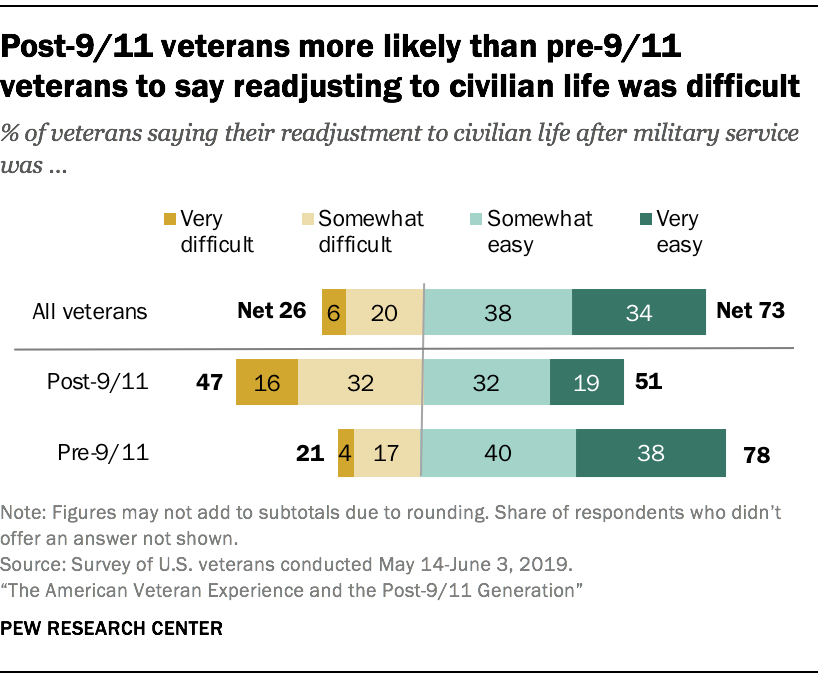 In their assessments of the ease or difficulty of the transition to civilian life, there is a significant gap between veterans who served before 9/11 and those who served more recently. About half of post-9/11 veterans say it was somewhat (32%) or very (16%) difficult for them to readjust to civilian life after their military service. By comparison, only about one-in-five veterans whose service ended before 9/11 say their transition was somewhat (17%) or very (4%) difficult. A large majority of pre-9/11 veterans (78%) say it was easy for them to make the transition.
In their assessments of the ease or difficulty of the transition to civilian life, there is a significant gap between veterans who served before 9/11 and those who served more recently. About half of post-9/11 veterans say it was somewhat (32%) or very (16%) difficult for them to readjust to civilian life after their military service. By comparison, only about one-in-five veterans whose service ended before 9/11 say their transition was somewhat (17%) or very (4%) difficult. A large majority of pre-9/11 veterans (78%) say it was easy for them to make the transition.
Veterans who served in combat are significantly more likely than those who did not to say their readjustment was difficult: 46% of those with some combat experience, compared with 18% of those without combat experience, describe their readjustment to civilian life as difficult.
Veterans who say they had emotionally traumatic or distressing experiences related to military service and those who say they have suffered from post-traumatic stress (PTS) as a result of their experiences in the military are among the most likely to say their transition to civilian life was difficult. Roughly half of those who had traumatic experiences (53%) and an even higher share of those who say they have suffered from PTS (66%) say their readjustment was at least somewhat difficult. Among those with PTS, three-in-ten say it was very difficult.
While most veterans say the military prepared them for active duty, only about half say they were well prepared for the transition to civilian life. Some 16% say the military prepared them very well for the transition and 36% say it prepared them somewhat well. At the same time, more than four-in-ten say the military did not prepare them too well (30%) or at all (15%).
These ratings do not differ significantly by era of service: Pre- and post-9/11 veterans are equally likely to say the military prepared them well for the transition. Nor do these assessments differ according to combat experience. Those who served in combat are just as likely as those who did not to say they were well prepared for the transition.
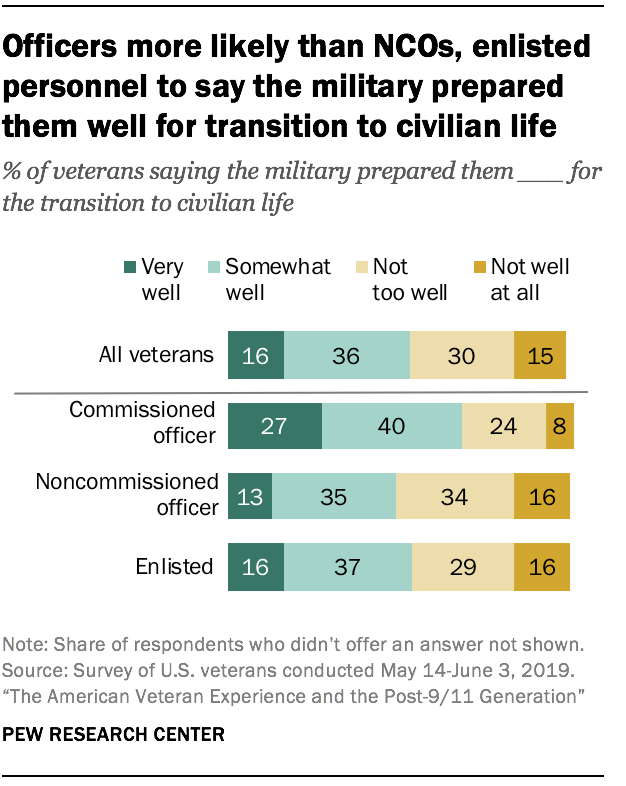 However, veterans who report having had emotionally traumatic experiences while in the military are significantly less likely than those who didn't have these types of experiences to say they felt well prepared for the transition (39% vs. 59%).
However, veterans who report having had emotionally traumatic experiences while in the military are significantly less likely than those who didn't have these types of experiences to say they felt well prepared for the transition (39% vs. 59%).
In addition, there are differences by rank. Veterans who served as commissioned officers are more likely to say the military prepared them well for the transition to civilian life than are those who served as NCOs or as enlisted personnel (67% vs. 48% and 54%, respectively).
Post-9/11 veterans faced more challenges than their predecessors in transitioning to civilian life
The survey asked about some emotional highs and lows veterans may have experienced in the first few years after they left the military. In general, veterans are more likely to say that they felt optimistic and proud than disconnected or disrespected. But there is a significant gap between veterans who served before 9/11 and those who served after, with veterans from the more recent era more likely to report having negative experiences.
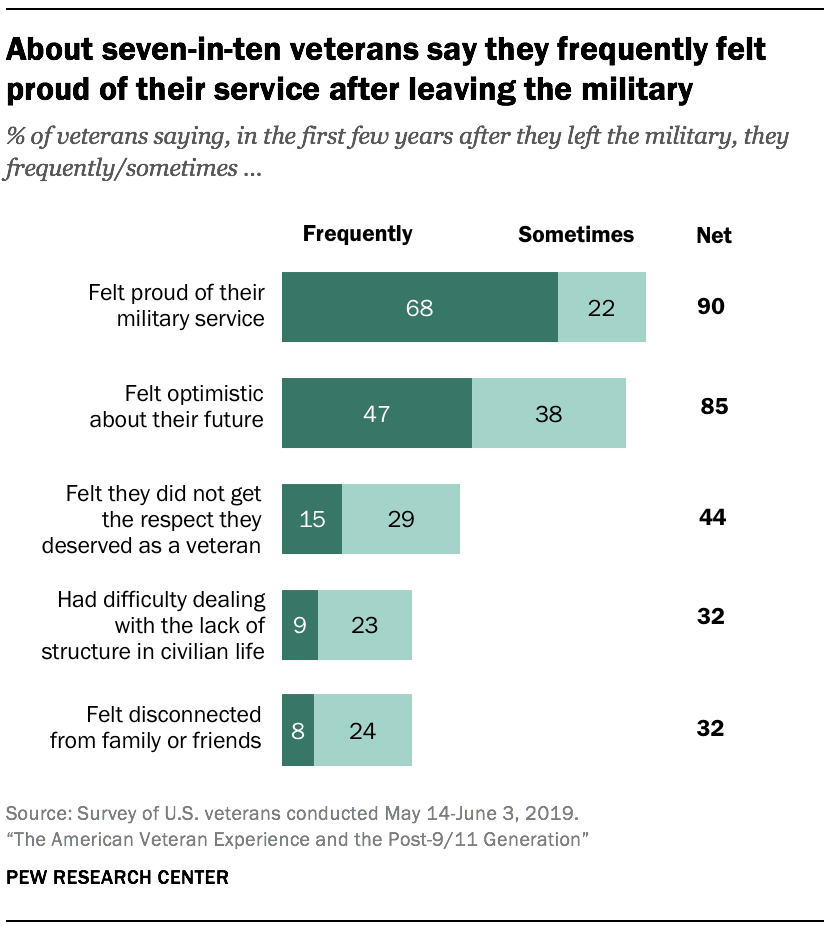 Roughly two-thirds of all veterans (68%) say, in the first few years after leaving the military, they frequently felt proud of their military service. An additional 22% say they sometimes felt proud, and 9% say they seldom or never felt this way. Pre-9/11 veterans are more likely to say they frequently felt proud of their service than are post-9/11 veterans (70% vs. 58%).
Roughly two-thirds of all veterans (68%) say, in the first few years after leaving the military, they frequently felt proud of their military service. An additional 22% say they sometimes felt proud, and 9% say they seldom or never felt this way. Pre-9/11 veterans are more likely to say they frequently felt proud of their service than are post-9/11 veterans (70% vs. 58%).
About half of veterans (47%) say they frequently felt optimistic about their future after leaving the military, 38% say they sometimes felt optimistic and 15% say they seldom or never felt this way. Here again the findings differ by era of service: 50% of pre-9/11 veterans say they frequently felt optimistic, compared with only a third of post-9/11 veterans. And roughly a quarter of post-9/11 veterans (23%) say they seldom or never felt optimistic about their future in the first few years after leaving the military.
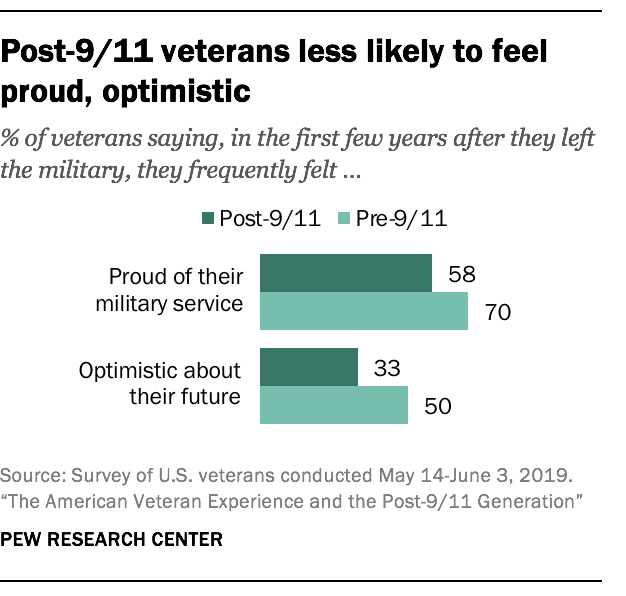 Feelings of optimism differ significantly depending on the types of experiences veterans had while on active duty. Veterans who say they had emotionally traumatic or distressing experiences are less likely to say they felt optimistic about their future after leaving the military than are those who didn't have these types of experiences – 35% of those who had traumatic experiences say they frequently felt optimistic compared with 53% of those who did not.
Feelings of optimism differ significantly depending on the types of experiences veterans had while on active duty. Veterans who say they had emotionally traumatic or distressing experiences are less likely to say they felt optimistic about their future after leaving the military than are those who didn't have these types of experiences – 35% of those who had traumatic experiences say they frequently felt optimistic compared with 53% of those who did not.
In addition, officers are more likely than NCOs or enlisted personnel to say they frequently felt optimistic after leaving the military – 70% vs. 51% and 40%, respectively.
Relatively few veterans (15%) say they frequently felt they didn't get the respect they deserved after leaving the military; 29% say they sometimes felt this way. A majority say they seldom (23%) or never (32%) felt this way.
These feelings don't differ significantly by era of service, but they do differ according to experiences veterans had while on active duty. Veterans with combat experience are about twice as likely as those without to say they frequently felt they didn't get the respect they deserved (23% vs. 12%). Similarly, veterans who had emotionally traumatic experiences and those who have suffered from PTS are much more likely than those who haven't to say they frequently felt disrespected. Three-in-ten veterans who say they've experienced PTS say they frequently felt they didn't get the respect they deserved after leaving the military; only 12% of those who didn't have PTS say the same.
About one-in-ten veterans overall (9%) say they frequently had difficulty dealing with the lack of structure in civilian life after leaving the military, and an additional 23% say they sometimes felt this way. About two-thirds say they seldom (24%) or never (43%) had difficulty with this. Post-9/11 veterans are more likely than those who served in earlier eras to say they frequently had difficulty dealing with the lack of structure in civilian life (23% vs. 6%).
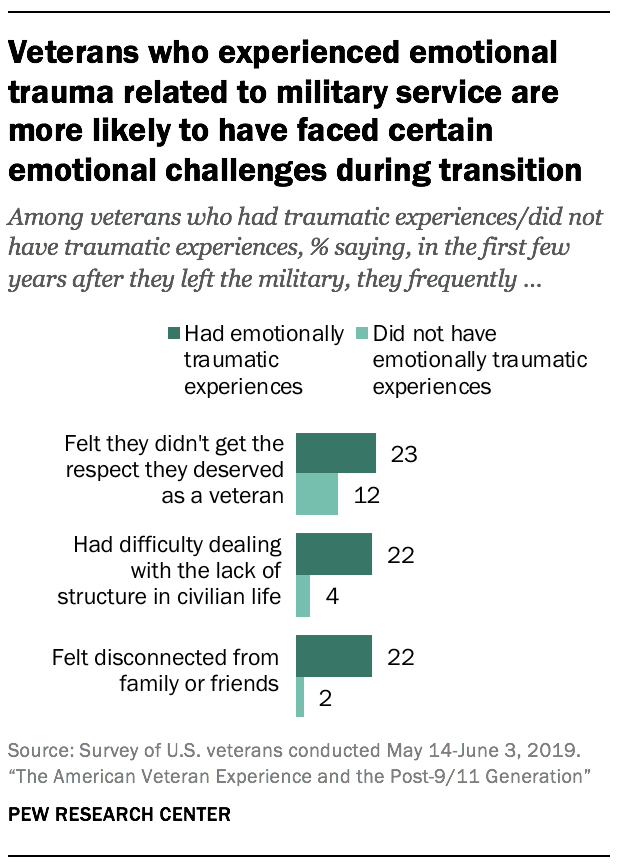 Here, again, those who had traumatic experiences while in the military and those who have suffered from PTS are more likely than those who didn't to have faced this challenge. About three-in-ten veterans who say they have suffered from PTS (29%) say they frequently had difficulty dealing with the lack of structure in civilian life, compared with 5% of those who haven't had PTS.
Here, again, those who had traumatic experiences while in the military and those who have suffered from PTS are more likely than those who didn't to have faced this challenge. About three-in-ten veterans who say they have suffered from PTS (29%) say they frequently had difficulty dealing with the lack of structure in civilian life, compared with 5% of those who haven't had PTS.
The patterns are similar when it comes to feeling disconnected from family or friends. Overall, relatively few veterans (8%) say they frequently felt disconnected from others after leaving the military, while 24% say they sometimes felt this way. About two-thirds say they seldom (21%) or never (47%) felt this way. Post-9/11 veterans, combat veterans, those who had emotionally traumatic experiences and those who have suffered from PTS are among the most likely to report having felt this way. For example, among veterans who say they had traumatic experiences related to their military service, 22% say they frequently felt this type of social isolation after leaving the military.
One-in-five veterans say they struggled with substance abuse after leaving the military
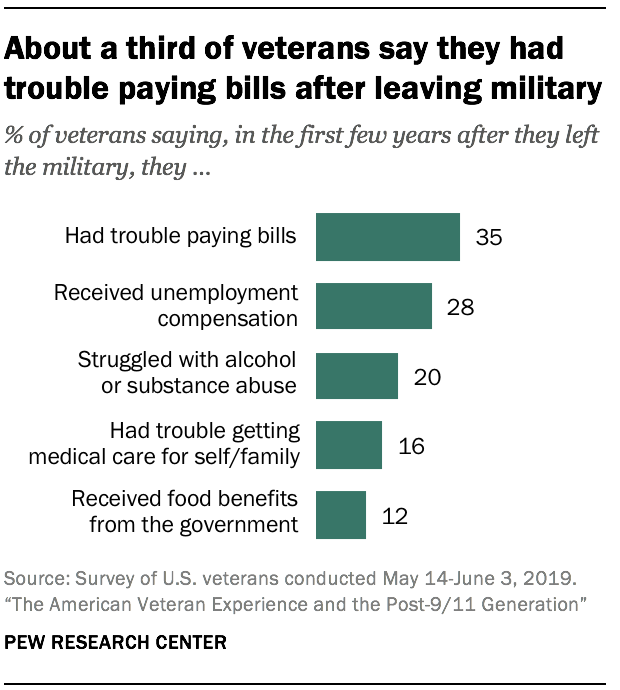 In addition to the emotional strains that may accompany transitioning from the military to civilian life, some veterans have faced financial and health challenges. About a third of all veterans (35%) say they had trouble paying their bills in the first few years after leaving the military. Roughly three-in-ten (28%) say they received unemployment benefits, 16% say they had trouble getting access to medical care when they or their family needed it, and 12% say they received food benefits (such as WIC or SNAP) from the government.
In addition to the emotional strains that may accompany transitioning from the military to civilian life, some veterans have faced financial and health challenges. About a third of all veterans (35%) say they had trouble paying their bills in the first few years after leaving the military. Roughly three-in-ten (28%) say they received unemployment benefits, 16% say they had trouble getting access to medical care when they or their family needed it, and 12% say they received food benefits (such as WIC or SNAP) from the government.
Having trouble paying bills or accessing health care as well as receiving food support is more common among post-9/11 veterans than among those who served before 9/11. The share from each era who say they received unemployment is identical.
One-in-five veterans say they struggled with alcohol or substance abuse in the first few years after leaving the military. Similar shares of post-9/11 (24%) and pre-9/11 (19%) veterans say they dealt with this issue.
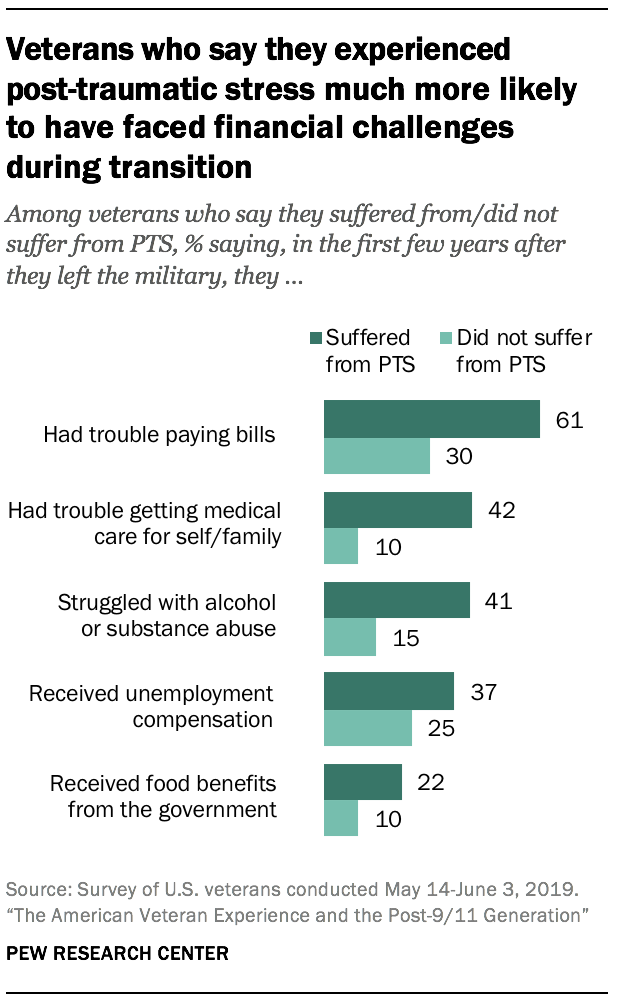 As is the case with some of the emotional challenges veterans face after leaving the military, experiences while on active duty are linked with financial difficulties during the transition. Veterans who say they had traumatic or distressing experiences while in the military and those who say they have suffered from PTS are more likely than those who did not have these types of experiences to say they faced financial troubles or struggled with substance abuse after transitioning to civilian life. For example, 61% of veterans who have suffered from PTS say they had trouble paying bills in the first few years after they left the military. By comparison, 30% of veterans who have not had PTS say they had this type of trouble. Similarly, while 42% of veterans who have dealt with PTS say they had trouble getting medical care for themselves or their family when they got out of the military, only 10% of veterans who have not had PTS say the same.
As is the case with some of the emotional challenges veterans face after leaving the military, experiences while on active duty are linked with financial difficulties during the transition. Veterans who say they had traumatic or distressing experiences while in the military and those who say they have suffered from PTS are more likely than those who did not have these types of experiences to say they faced financial troubles or struggled with substance abuse after transitioning to civilian life. For example, 61% of veterans who have suffered from PTS say they had trouble paying bills in the first few years after they left the military. By comparison, 30% of veterans who have not had PTS say they had this type of trouble. Similarly, while 42% of veterans who have dealt with PTS say they had trouble getting medical care for themselves or their family when they got out of the military, only 10% of veterans who have not had PTS say the same.
There are demographic differences as well. White veterans are much less likely than nonwhite veterans to report that, after leaving the military, they had trouble paying bills or accessing health care, or that they received unemployment or government food assistance.2 About half of nonwhite veterans (49%) say they had trouble paying bills in the first few years after leaving the military, compared with 32% of white veterans. And nonwhite veterans are more likely than white veterans to say they had trouble getting medical care for themselves or their family (29% vs. 12%).
Male veterans are about twice as likely as female veterans to say they struggled with alcohol or substance abuse after leaving the military (21% vs. 10%). Female veterans are more likely to have received food assistance than their male counterparts – 24% of women vs. 11% of men say they received benefits such as WIC or SNAP from the government in the first few years after leaving the military.
Veterans give the VA mixed ratings
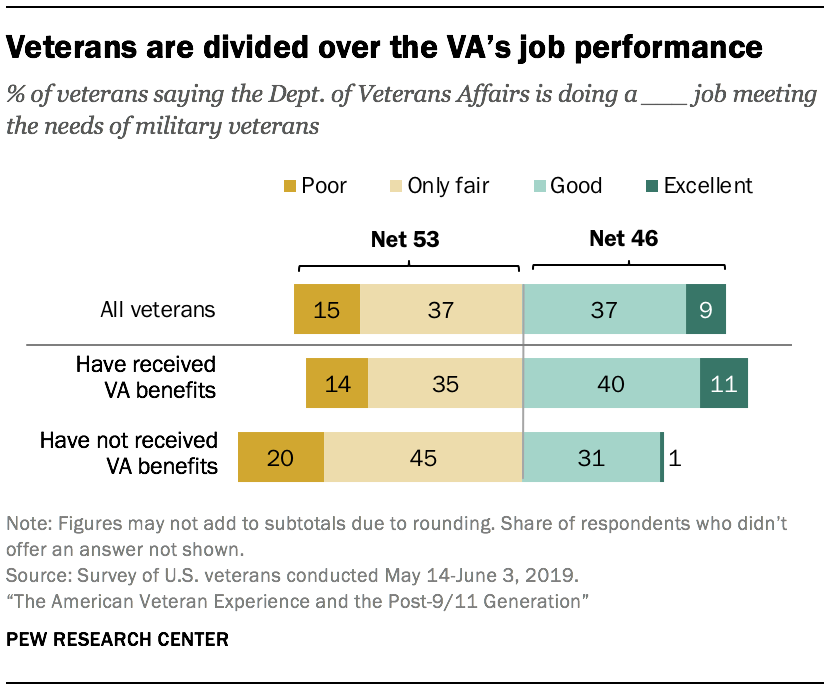 Most veterans (73%) say they have received benefits from the Department of Veterans Affairs (VA) – whether it be educational or medical benefits, job training, a home loan or a pension. This includes 81% of post-9/11 veterans and 71% of those who served before 9/11.
Most veterans (73%) say they have received benefits from the Department of Veterans Affairs (VA) – whether it be educational or medical benefits, job training, a home loan or a pension. This includes 81% of post-9/11 veterans and 71% of those who served before 9/11.
Veterans who served in combat are more likely than those who did not to say they have received VA benefits (82% vs. 69%). In addition, veterans who say they had emotionally traumatic experiences related to their military service and those who say they've suffered from PTS are more likely than veterans who have not had these types of experiences to say they've received VA benefits. Some 86% of veterans who say they've had PTS say they have received VA benefits.
When it comes to their assessments of the job the VA is doing, 9% of veterans say the department is doing an excellent job meeting the needs of military veterans; an additional 37% say the VA is doing a good job. About half say it's doing only a fair (37%) or poor (15%) job.
Combat veterans are somewhat more likely than those who did not experience combat to say the VA is doing an excellent or good job meeting the needs of today's veterans (53% vs. 43%). In addition, veterans who say they have received benefits from the VA are significantly more likely to rate the department positively. About half (51%) of veterans who have received VA benefits say the department is doing an excellent or good job. Among those who have not received these benefits, 32% say the same.
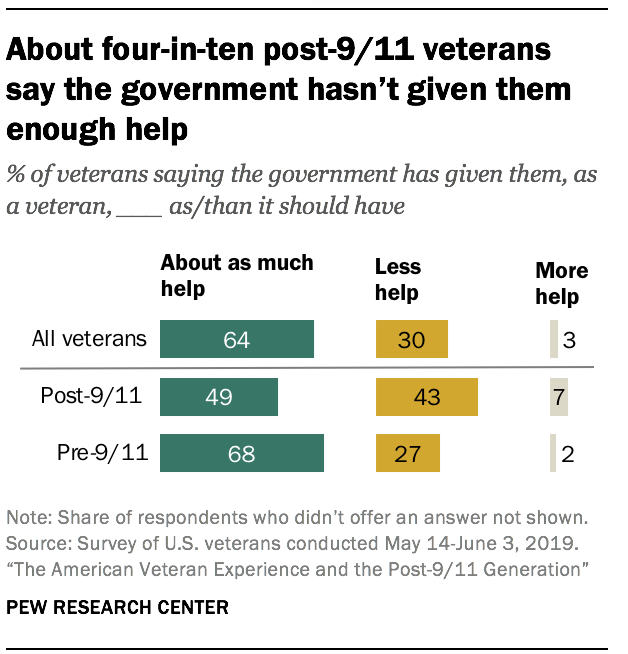 Thinking more generally about the help they've received from the government, veterans overall are largely satisfied: 64% say the government has given them about as much help as it should have, 30% say the government has given them less help than it should have and 3% say they've gotten too much help from the government.
Thinking more generally about the help they've received from the government, veterans overall are largely satisfied: 64% say the government has given them about as much help as it should have, 30% say the government has given them less help than it should have and 3% say they've gotten too much help from the government.
There is a significant gap between pre- and post-9/11 veterans on this measure. While 68% of pre-9/11 veterans say they've gotten about as much help as they should from the government, only about half (49%) of post-9/11 veterans say the same. Some 43% of post-9/11 veterans say they've gotten less help from the government than they should have.
White veterans are more likely than nonwhite veterans to say the government has given them the right amount of help (67% vs. 55%). Four-in-ten nonwhite veterans – compared with 23% of white veterans – say the government hasn't given them as much help as it should have.
Veterans who had emotionally traumatic experiences related to their military service, as well as those who have suffered from PTS, are significantly more likely than other veterans to say the government hasn't done enough for them. Among those who had traumatic experiences, 43% say the government hasn't done enough for them; 25% of those who haven't had these types of experiences say the same. Veterans who have suffered from PTS are about twice as likely as those who have not to say the government hasn't done enough to help them (54% vs. 25%).
Source: https://www.pewresearch.org/social-trends/2019/09/10/readjusting-to-civilian-life/
0 Response to "Soldiers Found the Adjustment to Civilian Life Easy"
Post a Comment